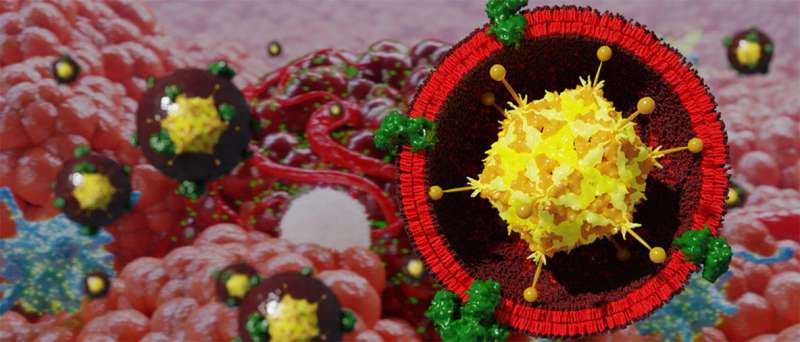Advanced viral nanovaccine for cancer immunotherapy

Researchers at the University of Helsinki have discovered a novel system to generate an artificially enveloped oncolytic adenovirus to direct the immune response against cancer.
Virus-based cancer vaccines are nowadays considered an interesting approach in the field of cancer immunotherapy. Targeting tumor-associated antigens is proven to be effective. However, the identification of these antigens remains challenging.
Researchers at the Faculty of Pharmacy, Manlio Fusciello, from the research group led by Professor Vincenzo Cerullo, and Dr. Flavia Fontana, from the research group led by Professor Hélder Santos, and their co-workers, have developed ExtraCRAd, a novel cancer vaccine platform, consisting of an oncolytic adenovirus wrapped in an artificial envelope made of cancer-cell membrane. Oncolytic virus therapy uses modified viruses that can infect and destroy tumor cells but don't harm normal cells.
"ExtraCRAd is a versatile and advanced technology for cancer treatment, a result of the synergetic effect between the oncolytic virus and the cancer-cell membranes," says Professor Santos.
Professor Cerullo continues, "Overall, ExtraCRAd might serve as the next generation of personalized cancer vaccines with enhanced features over standard oncolytic virus therapy, representing an alternative way to immunologically target cancer."
Researchers from the University of Helsinki have demonstrated that ExtraCRAd displays an increased infectivity and oncolytic effect in vitro, and in a human-relevant animal model of tumor in vivo. They also show that this new nanovaccine platform controls the growth of aggressive melanoma and lung tumors both in preventive and therapeutic vaccination strategy, creating a highly specific anti-cancer immune response.
"Building artificial envelopes made of cancer-cell membrane is a new and creative approach that our lab has developed together with Santos' Lab. This would have not been possible using the expertise of only one laboratory," adds Professor Cerullo.
Multidisciplinary collaboration
"This project again emphasizes the importance of multidisciplinary collaboration, mutual trust and ultimately the importance of the work environment. We both have expanded our personal knowledge by stepping outside of our comfort zones," note researchers Fusciello and Fontana, who were also awarded Joint Projects of the Young Researchers funding by the Drug Research Program for this project. "We highly recommend that young scientists be curious and have more discussions with those around them. The next great idea is just around the corner."
More information: Manlio Fusciello et al. Artificially cloaked viral nanovaccine for cancer immunotherapy, Nature Communications (2019). DOI: 10.1038/s41467-019-13744-8
Journal information: Nature Communications
Provided by University of Helsinki



















